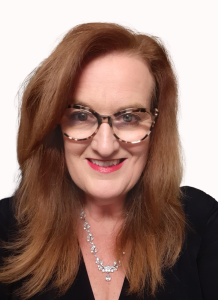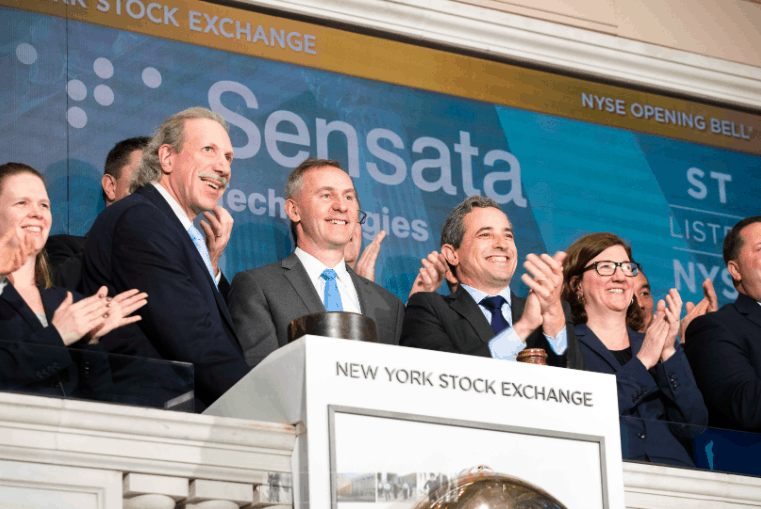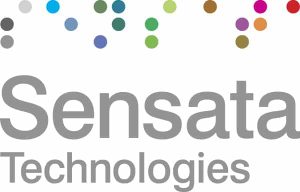When Sensata Technologies was founded over 100 years ago in Attleboro, it made gold plates for the nearby Rhode Island jewelry industry. Today, the company is a leading, global industrial technology company that produces sensors, sensor-based solutions, and essential component products in 13 offices around the world, shipping over one billion units per year. It’s a remarkable organizational journey, one marked by constant evolution, adaptation, and above all, great leadership.
This year, Sensata is recognized in the MassTLC Tech Top 50 in three distinct categories: “Company Culture,” “Inclusivity Impact,” and a “Leadership” award for CEO and President Jeff Cote, who assumed his role in March 2020 shortly before one of Sensata’s most unprecedented years yet.
Under Jeff’s leadership over the past nearly two years, Sensata not only survived, but has thrived. What’s the secret? Peta Conn, Executive Vice President, Head of the Americas at Invest Northern Ireland – a Tech Top 50 Platinum Sponsor – spoke with Jeff to find out from the source.
 From the importance of listening and adapting to changes in supply chains, the Great Resignation, and tying senior management compensation to improvements in Diversity, Equity, and Inclusion metrics, Jeff is thinking big and not holding back as he leads Sensata into its next evolution and beyond.
From the importance of listening and adapting to changes in supply chains, the Great Resignation, and tying senior management compensation to improvements in Diversity, Equity, and Inclusion metrics, Jeff is thinking big and not holding back as he leads Sensata into its next evolution and beyond.
___
Peta Conn: For those who don’t know about Sensata, could you just tell us a little bit about the company?
Jeff Cote: My favorite topic. Sensata is a company that’s been around for a while. It’s over 100 years old. Although some may not know the name, the interesting aspect is that we’re absolutely certain that everybody uses our products every day. We’re very ubiquitous. You see our products in your homes, in your cars, in your places of work, in your other modes of transportation.
We serve a variety of OEMs, tier-one customers, and aftermarket customers in a variety of end markets – automotive, heavy vehicle, off-road, agriculture, recreational vehicles, aerospace, and also a number of industrial markets, smart buildings, factories, clean energy, and a variety of diversified industries. As a company, we benefit from a number of trends. Some have been around for a long time. Regulation and need for cleaner, more efficient, safer systems has been a trend that Sensata has benefited from for decades.
But new trends are emerging around electrification of everything and the infrastructure necessary to build that broad IoT, internet of things, so as sensors and the nature of them and collecting them in the cloud and the wireless capability emerges, these are trends that our products will enable. It really drives very long-term, what we call secular, rather than market growth for us as a company.
It’s a very exciting time, but it’s a company that’s been around for a long time, and we’ve reinvented ourselves four or five times. Way back when we started as a plating company serving the jewelry industry, and now we’re a leading technology company serving electrification needs and IoT. There’s been a lot of change that’s occurred over those 100 plus years.
Peta Conn: Sensata was honored in MassTLC’s Tech Top 50 for company culture, inclusivity impact, and leadership, which is incredibly impressive. What does it mean to you to have received that recognition across these areas?
Jeff Cote: I have to start with the fact that I’m humbled that Sensata received this recognition. Second, I would say that although the leadership award had my name attached to it, it’s the work of a lot of people that make it happen, and I want to be very clear on that recognition. It goes to all of the employees that work to make us such a great company. It’s great to be recognized. We don’t do this to be recognized, but it’s a very nice validation that what we are doing is successful in terms of our efforts to build a stronger, more sustainable, more inclusive, more equitable company, so it means a lot to be recognized in this area.
Peta Conn: It seems like the three areas [company culture, inclusivity impact, and leadership] are all connected and all underpin Sensata’s transformation under your leadership, fully acknowledging it was the team approach. What are you doing in each of those areas and how do they support each other?
Jeff Cote: Let me start with culture. Everybody has heard this saying that “culture eats strategy for breakfast.” We understand at Sensata the importance of having a great strategy, but we also understand and see that many great strategies fail because of poor execution or because of the lack of a strong culture to execute against that strategy, so we believe that having a strong culture is a necessary foundation for long-term success.
On the inclusivity side, we believe a more diverse workforce makes us a better company. It’s not because it’s the right thing to do, it’s because we truly do believe that it makes us better. I think it makes me better to be surrounded by more diverse folks. It helps me think outside the box and think differently about how we problem solve and what we do. And in order to have a more diverse workforce, we need to have a culture of inclusivity.
“It’s not because it’s the right thing to do, it’s because we truly do believe that it makes us better. I think it makes me better to be surrounded by more diverse folks. It helps me think outside the box and think differently about how we problem solve and what we do”
I, as a leader, and all of our leaders play an incredibly important role in creating that inclusive environment where everybody feels welcome and everyone feels they can achieve the success that they’re looking for individually and the success that we’re looking to achieve as a company. On the leadership front, leaders play a very important role in building culture in terms of creating an inclusive work environment and building a diverse workforce.
We, as a company, have very ambitious transformational goals for ourselves and executing on that strategy will not be possible if we don’t have the building blocks, the foundation for long-term success that really does start with culture and inclusivity and having a diverse employee base.
Peta Conn: Sensata is a global organization. How do you manage the global workforce to ensure everybody is aligned with the organization’s goals in your DEI strategy?
Jeff Cote: It’s a lot of work. We just finished up our quarterly town hall where we get everybody globally on a call. Now, we have an indirect employee population of about 5,000, and we get over 1000 people attending. We record it, people watch it afterwards. That’s just one example of how we gain alignment. We do countless meetings with folks, we’ve amped up the virtual aspect, but historically we’ve done a lot of travel to make sure that we’re going out, and we’re visiting with people to not only gain alignment, but I think more importantly to gain buy-in.
The days of people just doing as they’re told based upon their leaders coming in and saying, “This is important,” are gone. Now you need to take the time to make sure that you’re explaining to them why. You’re listening to their feedback. You’re having a dialogue with them, as opposed to simply just saying, “This is the direction we’re going, let’s all charge the hill.” Again, it requires just constant communication.
My view is that the role of a leader is not only to build the right strategy but to gain that alignment and buy-in regarding where we’re going and to create that energy, that shared vision of where we’re going. There’s no shortcut to do that. It’s just hard work, every day, communicating it over and over again, and responding to questions as we go.
“The role of a leader is not only to build the right strategy but to gain that alignment and buy-in regarding where we’re going and to create that energy, that shared vision of where we’re going. There’s no shortcut to do that. It’s just hard work every day, communicating it over and over again, and responding to questions as we go.”
Peta Conn: You started just before COVID hit. Did it change your strategy in any way? As we start to manage the impact of COVID, a lot of teams are getting “Zoom fatigue.” Is the company looking at new strategies in order to retain employee engagement?
Jeff Cote: Yes. What’s happened over the last 18 months has, in my view, accelerated the need for change – how we communicate with our employees and how frequently we’re communicating with our employees and how we put them first. When the pandemic started to spread across the world, we had a very simple mantra: keep our people safe and serve our customers. People were shocked when we said that, but I knew if we do those two things, shareholders will be taken care of. We don’t need to put a fine point on it. If we make sure we take care of our people during this period of time and take care of our customers, the shareholders will be rewarded.
Now, how do we continue to drive engagement in this virtual environment which, candidly, is tiring? Everybody feels it. Even introverts gain energy from interaction with people because looking at a screen for 8 hours or 10 hours a day can be exhausting, and people tend to multitask and do other things that creates lack of focus for what they’re doing. When we can, in a safe way, we’re trying to get people back together, just to engage in not just business related but just to have a reunion, so to speak, with our people.
I’m doing some travel, when appropriate, but I want to be careful that my travel doesn’t cause people to feel as though they need to travel. It’s a safety, flexibility, and respect approach. If people are uncomfortable, we’re going to respect that. We’ve adopted a hybrid model for going back to work. I would tell you that I would not have thought in a million years, two years ago that we would have done that. I do believe that culture, collaboration, and innovation requires in-person time. But I also understand that we’ve benefited from, flexibility associated with the time we’ve gone through. It’s going to be a slow adjustment and it’s going to be unique to every location around the world, but we’re going to remain flexible. It’s a core value at Sensata to be flexible and make sure that we’re engaging with our people and motivating them and getting them excited about where we’re going.
Peta Conn: Sustainability is also important at Sensata. How are you addressing the challenges in this area?
Jeff Cote: We just issued our first sustainability report, which we’re really excited about, and we’re excited about thegoals we’ve set for ourselves. At the core, virtually every product Sensata makes today and over the past several decades results in a cleaner, safer, more efficient world. Sustainability has always inherently been part of what we do as a company, but we also take very seriously the responsibility we have associated with reducing carbon emissions from our own operations and from our supply chain.
To that end, we’re targeting a 10% reduction in greenhouse gas emissions by 2026. We’ve established a goal of carbon neutrality by 2050 like many other leading companies. We’ve addressed other sustainability topics in our report around Sensata’s mission associated with diversity, equity, inclusion, and responsible sourcing. Again, we believe that diversity benefits our employees, our customers, and our shareholders, and it makes us better as a company. We’ve also aligned some of those goals to our compensation structure for our leaders, specifically around leadership diversity because we believe that if we have a more diverse leadership team, we’ll have a more diverse organization.
We’re big believers that if you write down your goals, then you’re telling everybody, “These are the goals that we’re trying to achieve over a period of time,” and you get more organizational alignment around it. You get more focus and prioritization toward those goals. It’s a very important first step, and we’re excited about the journey that we’re going on.
Peta Conn: Disruption and transformation really does sum up Sensata’s journey and particularly since you became CEO. I’m assuming that your own leadership style has changed to embrace some of the new realities that CEOs have to accommodate now, including being expected to comment on social issues. What are some of the changes that you implemented this past year and a half? What were the opportunities for Sensata and yourself personally, and what challenges did you come across?
Jeff Cote: There is no question that my style and how I view things has changed over the last 18 months. And that’s clearly due to external factors, but it’s more been driven by a very conscious effort to listen. That’s hard sometimes for leaders, because leaders feel as though in order to be a leader, they have to be the ones speaking rather than listening.
That’s a characteristic that I think people tend to not view as being a leadership characteristic that’s important. I’ve done a lot of listening to employees, and I’ve learned so much from them, and I’ve adjusted my style. I’ve learned what I can do to be a better leader as a result of doing more listening. That includes formal guidance from several people who I admire and respect in the organization but a lot is informal as well.
In terms of the transformation that we’re embarking on as a company, many of these trends have been on their way for some time. I’m not the person that directed the company to focus on electrification. We’ve been focused on that for several years. We’re just really doubling down on it, because we see it impacting our customers at an accelerated pace. It’s been happening over the last decade, but in the last couple of years there’s been an acceleration, and we need to respond to that.
There’ll be more change in the end markets that we serve, with the customers that we serve in the next 10 years, than we’ve seen in the last 50. There is no question in my mind that’s going to happen. Sensata cannot change these trends, but we can embrace them. We can build the capabilities that we need to address the challenges that result. We’ve been doing that with our customers for decades. We’ve been helping our customers solve their most difficult challenges.
“There’ll be more change in the end markets that we serve, with the customers that we serve in the next 10 years, than we’ve seen in the last 50.”
Listening to customers, listening to experts regarding where these trends are going, and making sure that we’re positioned well to be able to help our customers with them is how we evolve. Regarding the change to our culture, communication style, and focus around diversity, equity, inclusion, and others, candidly, I don’t know another way.
We’ve spent a lot of time as a leadership team talking about this to make sure we’re all aligned, and as a team, we believe that collaborative decisions are better decisions. It takes longer to get there, but it’s well worth the effort. And I’ll tell you, the last 18 months have been a hard 18 months. It’s been the most challenging 18 months of my career, but I’ve never learned more, and I’ve never been more excited about where we’re going as well. I just try to talk to people and empathize that given the changes that we’re going through, we are coming out of this better as an organization and as individuals.
Peta Conn: It’s an incredibly disruptive time for employers at the moment. We have the Great Resignation. We have increased scrutiny for new candidates on company culture and what a company stands for. Sensata is leading in this area. What advice would you give other CEOs in terms of how to maintain great staff and keep them engaged in an organization?
Jeff Cote: We’re by no means in a perfect place on that. We can constantly improve. Again, one of our values is excellence and continuous improvement and recognizing that there’s always more to do is important. I’ve mentioned this already, but the advice I would give to others is to listen more, talk less, be thoughtful regarding your responses, and embrace the notion that you can’t accomplish your strategy without your people.
Trends that are impacting our business don’t stop with just trends associated with what our customers need. The trends around what our employees want are dramatic as well. I personally believe that the flexibility and the requirement to work from home to keep employees safe has accelerated that trend, hence the notion of this Great Resignation, where people are rethinking things. There’s been a trend towards just not working for a paycheck. Employees want to be mission-driven. They want to make a difference in the world. When I started my career 30 years ago, that wasn’t as prevalent, and now it is, and we need to adjust as leaders.
I understand I have to make the decision, but doing that in a collaborative way to make sure that I’m well-informed and people feel heard is important.
Peta Conn: Looking forward, what are the trends that you see most impacting Sensata in the next several years? How are you preparing for them?
Jeff Cote: There are several, and I’ve touched on a few of them. There is a continued trend associated with an increase in regulation on clean, efficient, safe systems. That will continue to impact our customers, and therefore our company for generations going forward. Then there are the trends associated with electrification in IoT, which will impact our company, and we’re investing in them both organically, and we’re looking for opportunities to acquire businesses that will allow us to accelerate our ability to serve those trends.
There’s also the trend associated with the workforce that we must embrace. Employees require or desire more flexibility, more empowerment, more engagement, more transparency in communications. We have to communicate even when sometimes what we have to say won’t be popular. We have to continue to have that open, transparent communication, and we need to make sure that we’re addressing and embracing those changes and not ignoring them and hoping that they go away. If we do that, we’ll continue to see the success that we’ve seen for the last 100 years as a company.
Peta Conn: When COVID hit, global supply chains were heavily disrupted. Have you rethought your approach to sourcing or your own global supply chain infrastructure?
Jeff Cote: It’s been a very interesting time. We really doubled down on the strategic relationships that we have with our suppliers. It starts with viewing that relationship as being very strategic and not transactional. When we do a post-mortem in terms of the challenges that we faced over the last 18 months, that is one of the key things, and we’re doing better with certain suppliers than with others. We’ll double down on that in terms of engaging with our supply chain in that fashion.
Similar to how we’re engaging with our people, it’s not transactional. It’s about making sure they understand why they’re here and how important they are. Without question, we’ll continue to modify the approach that we’ve had with our supply chain as we look forward to the future.
Peta Conn: In your MassTLC Tech Top 50 submission, you referenced that you use DE&I KPIs with your senior management team. What has the impact been? Would you recommend that as an approach for other organizations?
Jeff Cote: I think the team would be doing it regardless, it was very clear how important it was. We work harder at things that are being measured, and that drives outcomes for us as an organization. It’s just human nature that we do that. We align everything toward those goals, including metrics that drive our compensation.
So, would I recommend it? I would, but again, every organization’s going to be different. It’s about driving outcomes. For me as a leader, when I got my team together and we started talking about what was most important for us to accomplish not only in the next year but over the next 5, 10 years, we agreed that it was important that we tie it to some element of our compensation to really demonstrate that we are all in this together.
When we have an opportunity to hire new talent, are we looking very specifically at a more diverse population or not? Are we leading from the front and taking training around inclusive leadership? Those are other types of things that we’re doing, which I think are having a big impact in terms of how we’re moving in this direction as well.
We’re going to keep at it. This is a marathon. We’re going to keep working at it, and hopefully, we’ll continue to lead from the front in terms of the change and what we need to do.
___





